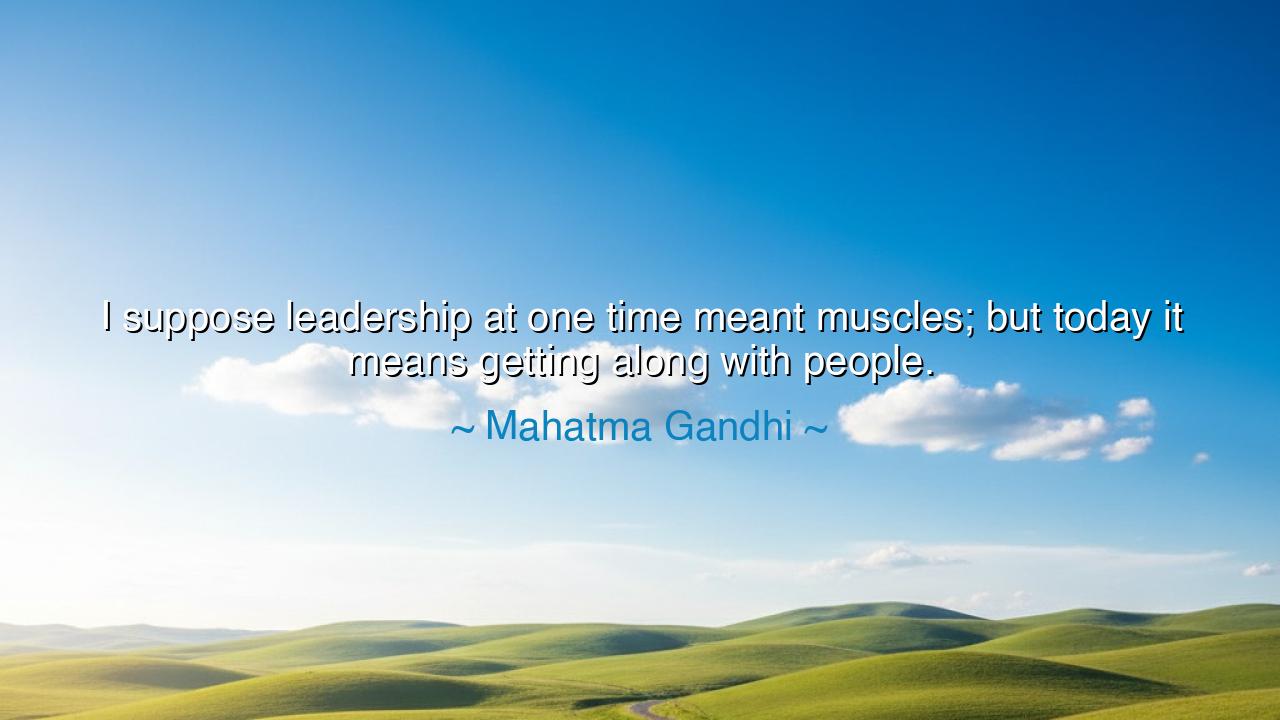
I suppose leadership at one time meant muscles; but today it
I suppose leadership at one time meant muscles; but today it means getting along with people.






“I suppose leadership at one time meant muscles; but today it means getting along with people.” Thus spoke Mahatma Gandhi, the humble yet indomitable spirit who reshaped the destiny of nations without ever raising a sword. His words pierce the heart of what leadership once was—and what it must become. In ages past, leadership was measured by power, by conquest, by the might of armies and the strength of command. But Gandhi, a man who led through truth rather than tyranny, reminds us that the highest form of leadership is not domination over others, but harmony with them. For in an age where nations rise not by force but by unity, the true leader conquers not bodies, but hearts.
To say that leadership once meant muscles is to recall a time when the strong ruled the weak, when fear forged obedience and courage was measured in blood. The kings of old led by decree, and their word was law; they believed that authority came from strength, and that to lead meant to command. Yet, Gandhi saw that this kind of power was fleeting. Empires built on fear crumble when fear fades; nations held by violence fracture when violence ceases. Only the power born of understanding and compassion can endure, for it binds not by chains, but by trust. And so he declared that in the new age, leadership would be measured not by how loudly a man commands, but by how deeply he connects.
Mahatma Gandhi, though frail in body, wielded a strength greater than any army—the strength of empathy, patience, and love. He led millions in India’s struggle for freedom not with muscles, but with morality. When he spoke, his voice carried no threat, yet his words shook an empire. He did not force men to follow; he inspired them. He walked with them, suffered with them, and treated even his enemies with respect. By getting along with people, by understanding their pain and appealing to their conscience, he united a nation divided by faith, caste, and class. This was leadership of a higher order—one that changed the course of history without a single act of violence.
Consider, then, the contrast between the conqueror and the peacemaker. Alexander the Great marched across continents, his sword carving empires into being. Yet when he died, his vast dominion splintered, for it was built on conquest, not connection. Gandhi, on the other hand, left behind no empire, no throne, no monument—but his legacy endures in the hearts of millions. Why? Because his power did not reside in muscle or fear, but in love and persuasion. His leadership was rooted in relationship, in the art of understanding others so deeply that they could not help but walk beside him.
The leader of the new age, as Gandhi foresaw, must be a master of humanity, not domination. He must listen more than he commands, seek harmony more than victory. To get along with people is not weakness—it is wisdom. It is the strength to calm anger with patience, to answer hatred with understanding, and to replace division with dialogue. The true leader builds bridges where others erect walls. He leads not from above, but from within, guiding others not by force of will, but by the strength of example.
Yet such leadership requires courage—perhaps a greater courage than the battlefield. It is easy to fight; it is harder to forgive. It is simple to shout orders; it is difficult to earn trust. The leader who chooses understanding over aggression, humility over pride, must bear loneliness, misunderstanding, and resistance. But in time, his gentleness becomes unshakable, and his example becomes light for others to follow. The leader who gets along with people does not compromise truth; he communicates it in a way that unites rather than divides.
Therefore, O seeker of wisdom, learn this from Gandhi’s teaching: the strength of the future is not in the arm, but in the heart. To lead in this world, you must first learn to understand it—to listen, to empathize, and to see the divine in every soul. Lead with kindness, and you will inspire loyalty. Lead with respect, and you will awaken greatness in others. For when you learn to work with people rather than over them, your leadership ceases to be about control—it becomes a shared journey toward truth.
The lesson is clear: Power without compassion is tyranny; authority without empathy is empty. The age of muscle has passed—the age of understanding has begun. To be a leader now is to be a servant of peace, a builder of bridges, a friend to all. So speak with gentleness, act with integrity, and seek always to get along with people, for in doing so you will command not their fear, but their love—and that is the truest strength of all.






AAdministratorAdministrator
Welcome, honored guests. Please leave a comment, we will respond soon